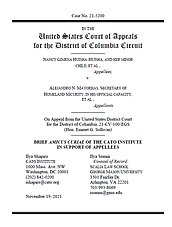Learn more about Cato’s Amicus Briefs Program.
Since March 2020, the Centers for Disease Control (CDC), has used its supposed powers under Section 265 of the Public Health Service Act of 1944 to expel hundreds of thousands of migrants and asylum seekers crossing the southern border*, citing a risk of Covid spread. Several of those affected challenged these actions, and the D.C. federal district court ruled in their favor. The government has now appealed to the D.C. Circuit Court of Appeals—and Cato filed an amicus brief supporting the lower-court ruling.
The government’s interpretation of the CDC’s powers would render the statute unconstitutional by violating the nondelegation doctrine. As the Supreme Court recently explained (Gundy v. United States, 2019), that principle of separation of powers holds that “Congress … may not transfer to another branch ‘powers which are strictly and exclusively legislative.’”
While Congress can give executive branch officials a wide range of discretion, it The latter is exactly what the CDC would enjoy if the government prevails in this case: It would have the power to exclude or deport virtually any entrants into the United States at any time.
Section 265 gives the CDC “the power to prohibit… the introduction of persons and property from such countries or places as he shall designate” whenever the agency “determines that by reason of the existence of any communicable disease in a foreign country there is serious danger of the introduction of such disease into the United States.” If this language is interpreted as giving the CDC virtually unlimited power to bar or deport migrants from such countries as it designates, it would violate constitutional constraints on Congress’s delegation of the legislative power.
By contrast, there would be no such nondelegation issue if the term “introduction” were limited to situations where the entry of persons from the country in question could result in the spread of a disease not already prevalent in the United States. The problem could also be averted if the D.C. Circuit adopts the plaintiffs’ interpretation of Section 265 as being limited to regulation of transportation, excluding the power to deport migrants, and subject to limitation by later statutes granting rights to asylum seekers.
For similar reasons, the CDC’s position also violates the longstanding principle that courts must not assume that Congress has delegated to the executive the power to decide a “major” question of public policy, unless Congress has clearly indicated its intent to do so.
The Supreme Court recently reaffirmed this vital rule in blocking another Covid-related CDC action, the eviction moratorium. In Alabama Association of Realtors v. HHS, the Court rejected the CDC’s claims that another provision of the Public Health Service Act gave it essentially limitless power to regulate housing. “Even if the text were ambiguous,” the Court found, “the sheer scope of the CDC’s claimed authority under Section 361(a) would counsel against the Government’s interpretation.”
The same agency has made the same mistake here. Rather than heed the admonition that Congress “does not … hide elephants in mouseholes,” (Whitman v. American Trucking, 2001),the CDC has tried to squeeze yet another pachyderm into a narrow provision of the Public Health Service Act.
There are few bigger elephants than near-total control over entry into the United States. The D.C. Circuit should affirm the ruling against the expulsion policy, which began under the Trump administration and has continued largely unabated under President Biden.

This work is licensed under a Creative Commons Attribution-NonCommercial-ShareAlike 4.0 International License.


